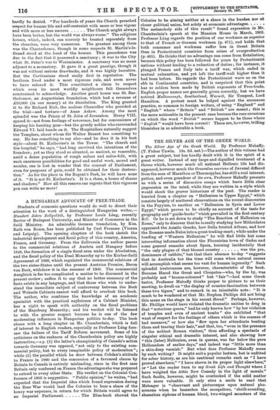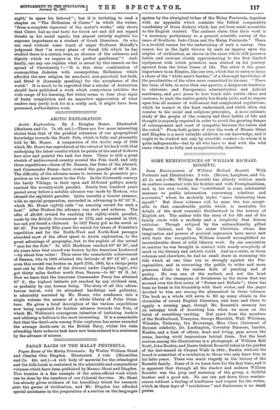THE SILVER AGE OF THE GREEK WORLD.
The Silver Age of the Greek World, By Professor Mabaffy. (T. Fisher llnwin. 13s. 6d. net.)—The anther of this volume had a great subject, but has hardly dealt with it in the spirit of a great writer. Instead of any large and dignified treatment of a theme which, however much all national Hellenic life had dis- appeared, however much the Graeetslus esuriens of Juvenal differed from the men of Marathon or Thermopylae, has still a real interest, pathos, and even grandeur of its own, Professor Mahaffy presents us with a series of discursive essays which leave little clear impression on the mind, while they are written in a style which would shock the graver historians of the• past, The reader is hurried from a chapter on "Hellenism in Upper Egypt," which consists largely of scattered observations on the recent discoveries in the Fayyum, to another on "Hellenism in Syria and Lower Egypt," which proves to be chiefly an account of the taste for geography and" guide-books " which prevailed in the first century B.C. Or he is set down to study "The Reaction of Hellenism on Rome," only to discover that he is really studying how Mithridates oppressed the Asiatic Greeks, how Sulla treated Athens, and how the Romans made Delos into a great trading-mart; while under the heading of "Western Hellenism" he will find little but some interesting information about the Phoenician town of Gades and some general remarks about Spain, learning incidentally that "the only plague of that blessed country was the pre. dominance of rabbits," but that their absence to-day "suggests that in Australia too the time will come when natural causes will accomplish what seems too vast for human ingenuity." Such splendid irrelevances are, however, aharacteristio of the book. Because Herod the Great and Cleopatra—who, by the by, was probably not "bronze-coloured" but "fair "—had some Greek tastes, Professor Mahaffy thinks proper to picture to us their meeting, to dwell on "the display of counter-fascination between these two tigers," and to remark in an inimitable note "It is much to be wondered at that Mr. Stephen Phillips did not bring this scene on the stage in his recent Herod." Perhaps, however, Mr. Phillips would have violated the dramatic unities to drag in that "notorious queen," had he only known how "by her violation of temples and even of ancient tombs" she exhibited "that want of respect for the feelings of others which is the essence of bad manners," or how she "flew upon her attendants beating them and tearing their hair," and that, too, "even in the presence of the noblest Roman visitors," thus affording a spectacle of singular ethical and dramatic interest, and also showing how this (later) Hellenism, even in queens, was far below the pure Hellenedom of earlier days," and indeed was "little more than a skin-deep varnish." But what does Professor Melmffy mean by such writing ? It might suits popular lecture, but is unfitted for sober history, as are his continual remarks such as "I have proved elsewhere," "I have shewn in its proper light elsewhere," or "Let the reader tarn to my Greek Life and Thought where I have weighed the Attic New Comedy in the light of morals." Such faults, however, might be overlooked if the solid matter were more valuable. It only stirs a smile to read that Meleager is "observant and picturesque upon natural phe- nomena when he beseeches the mosquitoes, 'shrill-sounding shameless siphons of human blood, two-winged monsters of the night,' to spare his beloved" ; but it is irritating to read a chapter on "The Hellenism of Cicero" in which the writer, "from a complete reperusal of the orator's works," only shows
• that Cicero had no real taste for Greek art and did not regard Greeks as his social equals, but almost entirely neglects his supreme importance as a student of Greek literature. Or who can read without some touch of anger Professor Mahaffy's judgment that "in every phase of Greek life which he has studied there is a certain want, an absence of the calmness and • dignity which we require in the perfect gentleman"? And, finally, can any one explain what is meant by this remark on the spread of Christianity ?—"It is this close combination of cosmopolitan Judaism with cosmopolitan Hellenism 'which afforded the new religion its non-local, non-parochial hot-beds, and fitted it (humanly speaking) for the acceptance of the world." • It is much to be regretted that a scholar of distinction should have published a work which everywhere exhibits the wide range of his learning, but which seems to bear clear signs of hasty compilation and an imperfect appreciation of what readers may justly look for in a costly and, it might have been presumed, authoritative work.























































 Previous page
Previous page